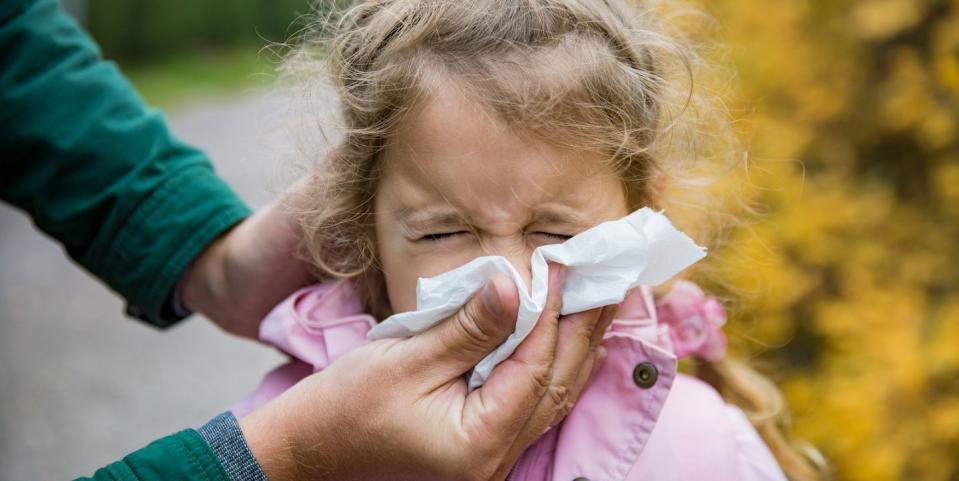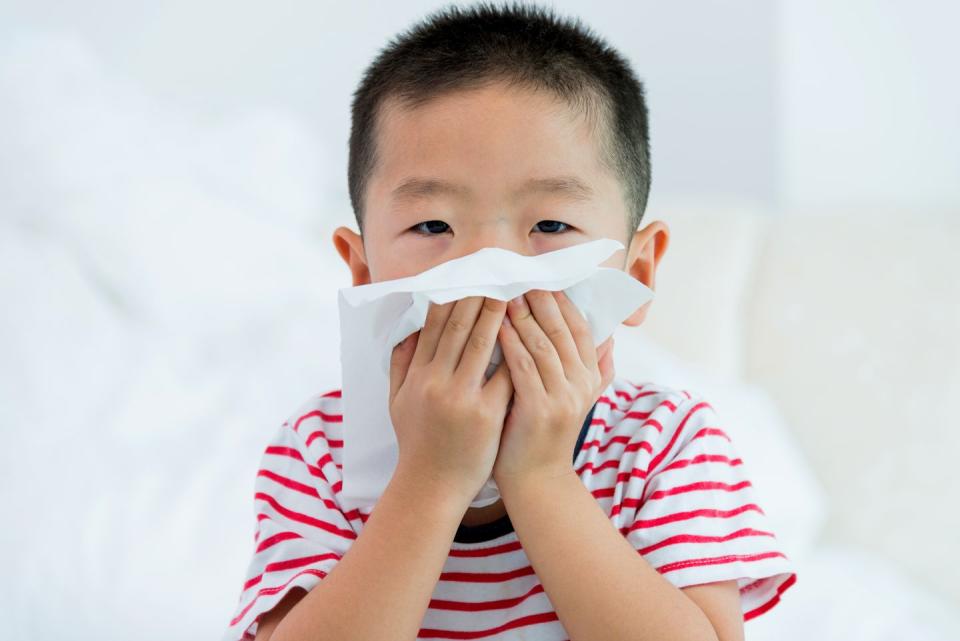Flu vaccine for children: the nasal spray flu vaccine explained

Flu season is here. The influenza virus, otherwise known as the seasonal flu, can be a very unpleasant illness for children, giving them a very poorly week in bed. It can also potentially lead to serious complications such as pneumonia, bronchitis or ear infections.
Fortunately, the flu vaccination is available every year on the NHS, in the form of a nasal spray flu vaccine, to help protect children who are at risk of flu.
Pharmacist Rita Ghelani explains how the nasal flu vaccine for children works, and whether your child is eligible for a free flu jab:
Children’s flu vaccine
The nasal spray flu vaccine is used to help prevent seasonal flu in children aged 2 to 17 years. It provides better protection against flu than the flu jab in children this age.
When children are given the vaccine, it not only protects them from flu, but also helps to reduce the spread of flu, so it protects other people too, such as babies, grandparents, pregnant women and anyone who runs an increased risk of serious complications, such as pneumonia if they catch the flu.
Flu vaccine for children key facts
If you’re considering the nasal spray flu vaccine for your child, here are some key facts to consider:
Allowing your child to have the flu vaccine is the best way to protect them and your family from flu.
The nasal flu vaccine can’t cause flu in children with a healthy immune system.
The most common side-effects are a blocked or runny nose, headache, reduced appetite or feeling a bit poorly. These get better in a couple of days.
Children aged two to nine years who haven’t had a flu vaccine before and who have an underlying medical condition may be given a second dose of the vaccine (one spray in each nostril) at least four weeks after their first vaccination.
The vaccine should be repeated each year before the start of the flu season. The best time to have it is from October to late November.
As the main flu viruses can change each year, a new nasal spray vaccine has to be given each year - the current brand of nasal spray flu vaccine available in the UK is called Fluenz Tetra.
The nasal spray vaccine contains pork gelatine. If this is not suitable, speak to your child's nurse or doctor about your options.
Which children will be offered the flu vaccine?
As part of the childhood immunisation schedule, all children aged two or three years will be offered the nasal spray flu vaccine by their GP.
Children in school years reception to year five will be offered the vaccine in school by the school nursing team, as will all primary school-aged children in former primary school pilot areas. Children in these age groups who are being home-schooled will be offered the vaccine by their GP.
In some parts of the country other school-aged children will also be offered the vaccine. The flu programme is being gradually extended each year until it includes all children up to 17 years of age.
A yearly flu vaccine is also recommended for all children older than six months of age who have an underlying health condition that increases their risk of flu complications, such as diabetes, HIV infection, a weakened immune system, or long-term heart, kidney, liver, neurological or lung disease, including asthma.
Children aged between six months and two years who have any of these long-term health conditions will be offered the injected flu vaccine, because the nasal spray flu vaccine can cause wheezing in this age group.
How does the flu vaccine for children work?
The nasal spray flu vaccine for children contains live but weakened forms of four different strains of the flu virus (two of type A, which causes the worst epidemics, and two of type B, which most commonly affects children). It works by stimulating your child’s immune system to produce antibodies against the flu virus, without actually causing flu. The antibodies stay in the child’s body so that if they’re exposed to the flu virus naturally, their immune system can recognise it, attack it and prevent it from causing flu.
The flu virus is constantly changing its structure (mutating) and different strains become more or less common each year. Every year, the World Health Organisation and the EU identify which strains are likely to be prevalent for that year’s flu season and new vaccines are produced to protect against these strains. This is why a flu vaccine is needed every year.
Your child will usually be protected from flu within two to three weeks after having the vaccine. The length of the protection varies, but usually lasts 6 to 12 months.
The nasal flu vaccine for children is less effective than the flu jab in adults, so is not suitable for adults aged 18 years and over.
Can the flu vaccine give your children flu?
The nasal spray flu vaccine for children contains live but weakened strains of the flu virus. It can’t cause flu in children with a healthy immune system.
Children can shed small amounts of the virus after having the vaccine. However, the shed virus doesn’t survive for long and because it’s weakened, it can’t cause flu if it's picked up by someone with a healthy immune system, such as other children in school who aren't having the vaccine.
There is a theoretical risk that shed virus could cause flu in someone with a very weak immune system, for example people who are in isolation after a bone marrow transplant. Children who’ve had the vaccine should avoid close contact with people who are severely immunocompromised for one to two weeks after having the vaccine. Children who live with someone who has a very weak immune system should be given the flu jab instead.
The flu vaccine will only protect against flu caused by the strains of the influenza virus closely related to those found in the vaccine. It won’t prevent flu caused by strains that are not in the vaccine, or flu-like illnesses caused by other germs.
Who should not have the nasal spray flu vaccine?
If your child has a feverish illness or infection, a heavily blocked or runny nose, or is wheezy, they shouldn’t have the nasal flu vaccine until they are better.
The nasal flu vaccine is not suitable for the following children:
Children under two years of age.
Children who have ever had a serious allergic reaction (anaphylaxis) to egg, or to the antibiotic gentamicin. These are used in the manufacture of the vaccine and may be present in tiny amounts.
Children with a weak immune system, for example due to a genetic defect, disease such as leukaemia or lymphoma, or treatment with immunosuppressant medicines such as chemotherapy, high-dose corticosteroids, or immunosuppressants, eg used following an organ transplant.
Children with symptomatic HIV infection.
Children with severe asthma.
Children taking medicines containing salicylates.

Potential nasal spray flu vaccine side-effects
Vaccines can affect people in different ways. The following are some of the side-effects that may be associated with the nasal flu vaccine. Just because a side effect is stated here doesn’t mean that all children having this vaccine will experience that or any side effect.
The nasal flu vaccine can’t cause flu in children with a healthy immune system.
Very common side-effects
These side-effects affect more than 1 in 10 children:
Blocked or runny nose.
Decreased appetite.
Feeling generally unwell.
Common side-effects
These affect between 1 in 10 and 1 in 100 children:
Aching muscles (myalgia).
Fever. If your child is uncomfortable you can bring down a fever and ease aches and pains with paracetamol.
Uncommon side-effects
These are rare and affect between 1 in 100 and 1 in 1000 children:
Rash.
Allergic reactions such swelling of the face or tongue, shortness of breath or itchy skin rash.
Severe allergic reactions to vaccines are extremely rare and anyone who is trained to administer vaccines is also trained in how to deal with them. Recovery is complete with treatment.
If you think your child has experienced a side-effect and you are concerned, you can report this using the yellow card website
Flu vaccine for children medicine interactions
It’s important to tell the person administering this vaccine if your child is taking any medicines.
The nasal spray flu vaccine must not be given to children whose immune system is very weak as a result of treatment with immunosuppressant medicines, such as:
• Chemotherapy
Chemotherapy for cancer (this vaccine should be not be given until at least six months after the last chemotherapy dose)
• Radiotherapy
Generalised radiotherapy for cancer (this vaccine should be not be given until at least six months after the last radiotherapy dose)
• Corticosteroids
High-dose corticosteroids, such as prednisolone (this vaccine should not be given until at least three months after stopping treatment with high doses of corticosteroids taken by mouth or injection)
• Immunosuppressants
Immunosuppressants used to prevent rejection of organ transplants, such as azathioprine, ciclosporin, mycophenolate, tacrolimus (this vaccine should not be given until at least 12 months after stopping treatment).
Other medicines that suppress the activity of the immune system, such as abatacept, adalimumab, anakinra, efalizumab, etanercept, infliximab, leflunomide.
Other flu vaccine medicine interactions
The nasal spray flu vaccine should not be given to a child who is taking any salicylate-containing medicines, for example aspirin or aspirin-containing medicines, due to a very small risk of a condition called Reye’s syndrome, which affects the brain and liver.
Aspirin and aspirin-containing medicines should not be given to children under 18 years old for at least four weeks after the vaccine and then only if prescribed by a doctor.
Antiviral medicines that are used to treat flu, such as oseltamivir and zanamivir, can make the nasal flu vaccine less effective. If your child is taking one of these medicines they shouldn’t have the nasal flu vaccine for at least two days after finishing the course. If treatment with oseltamivir or zanamivir is needed in the two weeks after having this vaccine they are likely to make the vaccine less effective and another dose may be needed.
Last updated: 29-09-2020
You Might Also Like

